
Professor Sarah Barman is Professor of Computer Vision at the School of Computer Science and Mathematics, Kingston University. 
Tell us a bit about your career in science and how you came to focus on your specialism.
My research specialism is medical image analysis and my interest in this developed by chance. I was in the process of finishing my PhD in Optical Physics at King’s College London and a postdoctoral position became available in the Image Processing Group, also in the Physics Department. Even though this was in a different area to my PhD project, it still used the same research skills – which included programming. The project focused on developing image analysis algorithms to detect a condition that affects implant lenses after cataract surgery, which sounded very exciting to me.
I worked as a postdoc for four years on this project and, while I was there, I also became familiar with retinal image analysis research. When I moved to Kingston to take up a Senior Lectureship role, this was the first area I started exploring for my own independent research. I began to explore artificial intelligence (AI) algorithms during my time as a postdoc at King’s, and have continued to develop my interest and research in this direction, most recently incorporating AI deep learning algorithms.
What made you want to become a scientist/academic?
I enjoyed science subjects the most at school and this led me to undertake further study in physics. I became an academic because I really enjoyed undertaking the research for my PhD project and so I decided that I wanted to continue in research for my career. Also, as a postdoc I had the opportunity to lecture to MSc students and, as it seemed enjoyable, I decided to give academia a try.
Did you have any role models/anyone that inspired you while you were early in your career?
Early in my career, my PhD supervisor was very encouraging. He had a big impact on creating a very positive experience for me as a researcher and I’m very grateful to him for this.
How would you describe your experience as a woman scientist?
Overall, it has been a very good experience and I have enjoyed having such an engaging and interesting role. I’m fortunate that the current school and faculty management at Kingston are very supportive of my career in general and my research aims.
Why is it important to empower women in science?
In order to make advancements in science, it’s important that we optimise the resources we have to undertake the work. Encouraging everyone to participate in science if they are interested is a good way to do this.




